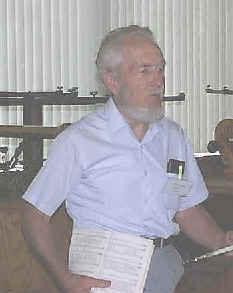
Volume 42 Number 6
ASA/CSCA 2000 Revisited
ASA/CSCA 2000 at Gordon C. north of Boston was typical of ASA Annual Meetings; it was full of interesting presentations relating science and Christianity. To offer a flavor of what you might expect at ASA01 in Kansas next year, what follows is a brief review of a few more ASA/CSCA 2000 talks, and more pictures. (See last issue for more ASA/CSCA 2000 coverage.)
Sunday Worship
Pablo Polischuk of Gordon-Conwell Seminary (and husband of Frances, who has been ASA's financial manager) gave the Sunday sermon. He started from the Genesis narrative, where Adam defines Eve as the mother of all humans after the Fall - to call things by name is to define. Pablo stressed that everything belongs to God, our Creator, and we have been placed here to be administrators of what belongs to God.
Working further into Genesis, Esau took God lightly, and was a "mama's boy." "It's easy to hate Esau," Pablo said. "What's annoying is that God loved Jacob" who practiced deceit. But the Lord has the prerogative to re-define reality and change names: Simon becomes Peter and Jacob, Israel. Humanity itself is redefined by God: Adam becomes Jesus. It is God who defines us and makes us servants of his kingdom.

Bruce Clark played cello at ASA00. Bruce is otherwise an aerospace engineer in the Cleveland, Ohio area.
Presented Papers
The focus on Genesis was retained in Ray Zimmer's talk. Ray sees the days of Genesis as an image through which the evolutionary record can be seen.
The focus on Genesis was retained in Ray Zimmer's talk. Ray sees the days of Genesis as an image that the evolutionary record can be seen through.
U. of Alberta dentistry prof, biology Ph.D. and theologian, Denis Lamoureux, exegeted Hebrew texts in presenting "Hermeneutical Lessons from the Heavens." Denis's theme was the point Luther made in his Lectures on Genesis: God accommodated the ancient Hebrew cosmogony of a solid canopy in the sky to deliver a distinctive revelatory message. Biblical texts affirming this view are found in Psalms 148 ("waters that are above the skies"), Ps. 104 (lays beams of heavens "on their waters"), Deut. 10:14, Neh. 9:6, and Ps. 113:4-6. In Job 37:17-18, raga ("expanse") is a flattening out, a firm, flat surface like a metal plate. In the Septuagint, stereoma means "firm surface." Ragia in the Vulgate is translated firmamentum, in the KJV, firmament; on the fourth creation day, God sets the stars in the firmament of heaven. And Hebrew for star means a luminous thread.
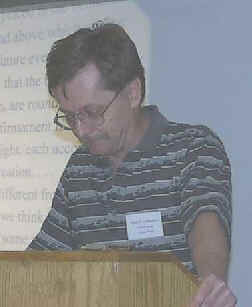
Denis Lamoureux on biblical creation.
The Scriptures tell us that Jesus is the Creator, not how Jesus created, Denis argued. He wrapped up by presenting a tabular schema showing the symmetrical structure of the Genesis 1 text (shown below). The days of creation are numbered accordingly.
|
formless |
void |
|
1 light |
4 sun |
|
2 waters (above and below) |
5 birds (above) fish (below) |
|
3 land |
6 animals |
Bob DeHaan offered a kind of hybrid account of origins, starting with Intelligent Design as the better explanation for the prebiotic universe with some overlap with subsequent Darwinian evolution, and Darwinian mechanisms last. In between are phyletic lifespan processes, and organisms and phyla that develop from the top down. Phyletic groups grow old and die out ("phylosenescence").
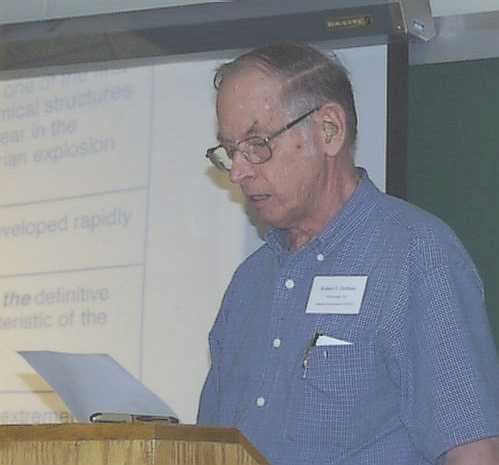
Bob DeHaan offered "hybrid" approach to origins.
Retired Case Western Reserve U. (CWRU) physiologist Tom Hoshiko's talk was action-oriented. Secular institutions are losing a memory of Christianity. At ASA's present membership (1,758), we are a "minor blip in academia." And ASA is in steady state. What should we do about this? Tom recommended the following: (1) sponsor ASA speakers; (2) effect campus prayer groups, through ASA chapters on Christian campuses; and (3) collaborate with other Christian groups. Tom advised starting with small group prayer. He gave an example from CWRU. In the past, sci/Xny speakers were the late Donald MacKay, Owen Gingerich, David Allen, and Fritz Schafer. Also at CWRU in the past were ASA's president Jay Hollman and John Wiester. The idea of a student journal was also floated.
Robert C. Newman capped off Sunday with a special address entitled "Cosmos and Contact: The Religion of Carl Sagan." Although Newman left Cornell U. with his doctorate in astrophysics shortly before astronomer Sagan arrived there, he has contacts with those who have known Sagan well, and has studied his views. He showed a 20-minute video clip from the movie Contact, and described the spiritual aspects of the Sagan saga.
On Monday, Dorothy Chappell of Wheaton C. gave the devotion, encouraging young ASA scientists. "What are the sins of omission?" she asked. Dorothy turned to 1 and 2 Corinthians where Paul affirms the Corinthians' growth in their Christian faith in a world that does not value truth. In our affluent society, we are to respond to our students and colleagues in science truthfully, civilly, and righteously.
George Murphy, a theologian and a theoretical physicist, spoke on chaos--not so much the mathematical kind but that of the monster Rahab, as in Isa. 51 and Ps. 89, not the Rahab of the book of Joshua, who helped Israel.
Following Hermann Gunkel, chaos is associated with the sea (Ps. 77) and its Leviathan monsters. George referred further to the association between Ps. 89's creation of the world to Ps. 77's creation of Israel in the Exodus. In Mark 4, Jesus, who overcomes the forces of chaos, walks on the sea (not water). In Rev. 12, the reincarnation of Leviathan is followed by the closing vision, where the sea is no more. George argued that non-historical accounts of creation are found in the biblical creation texts to challenge the faith of Israel and to make symbolic statements using powerful imagery.
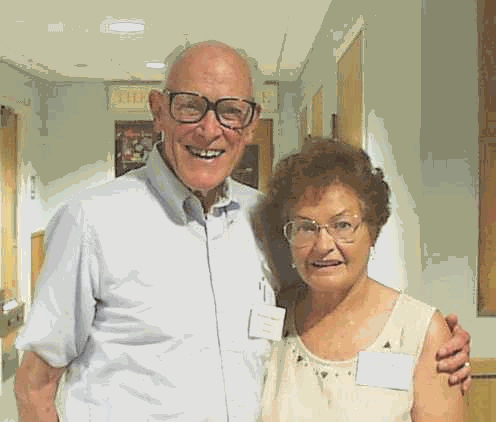
Richard and Evorine Beal, at ASA00. Richard is an entomologist and a theol
ogian.Discipling/Mentoring Panel
An ASA/CSCA 2000 panel addressing discipling and mentoring of students was put together by IVCF director of faculty ministries and chemist, Terry Morrison. First to speak was Wayne Becker, who considers discipling a definitive relationship, like marriage. He advised mentors to give disciples the "space and time" to make decisions rather than impose decisions on them. Although a formal mentor/disciple relationship is uncommon, a disciple of Wayne's attended and expressed his perspective.
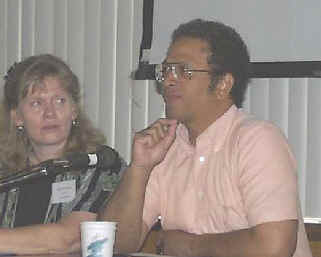
Judy Toronchuk and Daniel Hastings on mentoring panel.
Judy Toronchuk, a neuroscience prof. at Trinity Western U. in Langley, British Columbia, noted that professors are not often seen by students as people who struggle too. And professors are not always mentors. Students need to see Christianity lived out in order to emulate biblical character, in the exhilaration of research, patience, rigor, values we teach, and balance in life among church, research, and family. Students need to see that professors pray for them and are open to discuss their difficulties, such as with science/ faith questions, especially evolutionary psychology, Judy said. With a minority of women faculty and a majority of women students nowadays, Judy shares her struggles with women students. Some students need extra help with personal problems, and can see Judy as a woman like "mom."
Daniel Hastings, senior aerospace prof. at Massachusetts Institute of Technology (MIT), a school not noted for its nurturing qualities, quipped that "balance is out, integration is in." He listed some necessary conditions for success: (1) use all God's gifts; (2) invest in people as well as abstractions and machines; (3) seek the glory of God; (4) do everything in moderation. In university research, he said, moderation in doing research is not considered virtuous. Engineering at MIT has a formal mentoring plan between junior and senior faculty. The mentor helps a junior develop a coherent research focus, introduces him or her to senior researchers in the field, promotes his or her work; critiques papers before they are sent out, teaches him or her how to choose good students and get rid of bad students, and seeks integration.
Hastings reminds junior profs. that their identity is not grounded in the institution but in God. To be mentored is to have somebody there looking out for your interests who will give you good advice. Mentoring, Hastings concluded, is an opportunity for Christian witness.
Terry added that senior Christians have a responsibility to help junior Christians.
ASA01
"Caring for God's Creation"
Kansas State University
Manhattan, Kansas
July 20-23, 2001
Program Chairman: Joe Sheldon
jsheldon@messiah.edu
ASA 2000 Business Meeting
ASA's president is cardiologist Jay Hollman of Louisiana. In his Meeting address, he illustrated, by analogy with balloon angioplasty, that sci/rel is on the offensive. Some issues to consider are: knowledge growth, technological advances, greater interdependence among disciplines, and the need for authoritative information.
Speaking to ASA's strengths and weaknesses, areas of interest among the ASA leadership are the journal, web site, annual meeting, newsletter, and membership. Jay's observation of ASA is as a multidimensional organization--diverse, divided, and fascinating.

ASA President and cardiologist Jay Hollman
What does the Church need from the ASA? Answers to scientific questions, educational materials for home schoolers, and evangelical outreach to the scientific community. Answers needed to scientific questions include the age of the earth, environmental issues, alternative medicine, Christian faith and criminal recidivism, alcohol and drug use, and the genetic proclivity to sin versus human responsibility.
ASA can reach one of the unreached people groups: scientists. Jay offered some solutions for working on these issues: get grants, inculcate heroes/heroines, offer services to the church, and engage in cooperative evangelism.
Joe Sheldon gave Council news. Candidates for Council are Martin Price and Jack Swearengen. Bill Colburn has had to resign due to family health problems. Fred Hickernell was nominated to fill out Bill's term.
The Annual Meeting included a presentation of new fellows: Terry Morrison, Mark Kalthoff, Roman Miller, and Roger Kennett. In addition, special recognition was given to ASA members in attendance who have been members for fifty or more years: Wilbur Bullock, Paul Mauer, and John Vayhinger. ASA's director, Don Munro, announced that Frances Polischuk would be leaving ASA. Many thanks are due Frances for applying her financial and office management skills, which have helped to keep ASA organized and running smoothly.
Council member Dorothy Chappell announced that ASA's endowment fund is up to $70,000--not enough to draw from yet, but building.
The remaining ASA founder, F. Alton Everest, in California, sent his greetings to ASAers.
Physical Sciences Commission Meets at ASA/CSCA 2000
by Loren Haarsma
http://www.calvin.edu/~lhaarsma
The Physical Sciences Commission of the ASA met at this year's ASA/ CSCA annual meeting. We discussed two broad topics which the Physical Sciences Commission could directly address as a service to the rest of the ASA:
1. Science (and the scientific method) is not "inherently atheistic."
2. Christian scientists must work in the scientific culture, a culture which is predominantly secular and which promotes an idolatry of work.
We discussed what we could do to help young scientists in these areas. We also discussed the fact that none of us have much "free time" to devote to this project.
We decided to concentrate our efforts in two areas which could produce a fairly large pay-off with a relatively small investment of time:
1. Many Christian colleges require their faculty to submit short papers on the integration of their Christian faith with their scholarship. (Often, these papers are part of the tenure process.) We could ask the colleges, and the professors, for copies of them, and ask for permission to put these papers on a web site.
2. We could create a FAQ [frequently asked questions] for the ASA web site. The FAQ would offer brief answers to common questions, with references to additional material. Questions could include the following: How can one do science in a "Christian" way? What is "methodological naturalism"? How can I integrate my Christian faith into my scientific scholarship? How can I live a unified life as a Christian and a scientist?
If we are going to follow through on this, one or more people will have to volunteer some of their time to coordinate efforts. I'm willing to contribute some time and written material, but I don't wish to coordinate.
[ASAers who designated their commission as the PSC: Consider this an early opportunity to make a contribution to ASA efforts. ASA is only the result of the combined activities of all of us to promote the kingdom of God in our area of calling in science and technology. Ed.]
ASA Eastern PA Section Meeting
Despite the ubiquitous locality of the Internet, the value of personal presence continues to manifest itself organizationally in ASA as local sections. The idea of ASAers getting together locally has not swept over N. America, but it bubbles and perks.
The latest effervescence of ASA locality is the newly forming Eastern Pennsylvania section and their meeting, scheduled for Saturday, Oct. 28, from noon to 4:15 p.m., in McInnis Hall, room 120-121, at Eastern C., 1300 Eagle Rd., St. Davids, PA. Come early to register. Lunch is not provided, but can be obtained nearby. Registration is $5 for adults and free for students.
This should be good, especially for those new to sci/Xny. Two addresses are being given by one of ASA's most interesting speakers, historian of science Edward B. Davis of Messiah C. He will speak on "Christianity, Science, and the History of Science," in two parts. The broad coverage suggested by the title allows those with only general historical knowledge to gain a perspective on the subject.
RSVP Sara Miles at Eastern C. via email: smiles@eastern.edu. Get the map to the meeting at www.eastern.edu/campus/maps/directions.html
*
Robert DeHaanWhat ASAers Do
The July 2000 General Convention of the Episcopal Church authorized the Church's Working Group on Science, Technology, and Faith to develop instructional materials on significant issues in science and religion for use in congregations and seminaries. Bob Schneider of Berea C., who was elected a member of the Working Group's Steering Committee, is participating in this project.
Bob is also spending a fall sabbatical leave reading current literature on the topic of "Divine Action in Creation." He is focusing particularly on contemporary theologies of creation in an evolving cosmos, but is also looking at the "intelligent design" movement and its critics. Bob would welcome suggestions and discussions on these issues. You may write him at robert_schneider@berea.edu.
There are some potential openings for good people in Cairo, at the American University. Stan writes: "It really is the premier university in the Middle East (except for those in Israel), and a great opportunity for ASA members. In particular, the chemistry department here is looking for a good organic chemist with outstanding teaching and research credentials. Being able to mentor undergrads in research is a must."
Stan is there for a year and, he observes, a good way to influence this place for the long haul is to assist them in hiring the right people, professionally and in terms of personal involvement.
The May/June 1999 ASAN had a brief piece about grade-school science materials from Christian Schools International. Herman Proper works for the Ontario Alliance of Christian Schools (OACS) which has 73 schools and 12,500 students in Ontario and Prince Edward Island. They are familiar with the CSI materials and think they are of high quality.
In addition, the OACS produces curriculum materials using the CSI science textbooks as resources where they are suitable to their curriculum, and have developed its science program significantly in the past several years. OACS now has a science curriculum for grades K-8, plus a few materials for grades 9-12, and teacher manuals complete with lesson plans and student materials as black-line masters. Each teacher manual provides the resource needed for a complete unit of study. For further information, visit the OACS on-line at www.oacs.org or write to OACS, 617 Highway 53 East, Ancaster, Ontario, L9G 3K9; phone: 905-648-2100; fax: 905-648-2110.
UCLA atmospheric sciences grad student Johnny Lin
(jlin@atmos.ucla.edu) was prompted by Ted Davis to send a copy of an article he wrote for EOS, transactions of the American Geophysical Union (Vol. 81, No. 34, 22AUG00, p. 382)
-- a forum titled "Teaching Evolution, the Kansas Board of Education, and the Democratization of Science." In it, Lin offered an interpretation of the Kansas decision. Recent elections were held which ousted three of the board members who voted to remove evolution references in state testing.
Following a paper, "The Democratization of Science," written this year by Baylor U. theologian Barry Harvey, Lin writes that instead of an anomaly, the public distrust of science is part of a growing tendency of various groups to decide for themselves what constitutes good science. American religious life, in particular, is characterized by moving ecclesiastical authority from cultural and intellectual elites to the individual. Consequently, the increasing reluctance of Americans to trust the judgment of the scientific community is not a failure in science education but has deeper metaphysical roots.
Lin goes on to say that the philosophical underpinnings of science are more important now than in the 18th and 19th centuries, when Enlightenment rationalism allowed simpler answers (such as an appeal to the scientific method or "It works.") to cover the limitations of science. Scientists can present technical arguments and statements, but if society finds them uncompelling, the resulting gap is not due to ignorance of science as such but "by the lack of accepted standards by which to adjudicate that knowledge." And this difference in means for adjudicating the value of claims is, at its heart, a cultural and philosophical problem. The challenge of scientific populism is essentially philosophical, Lin concludes.
What should scientists do? Harvey intriguingly suggests that "scientists might have something to learn º from those who have been dealing with the challenge of American º populism for the last century and a half." Harvey suggests that religion, morality, politics, and science share a common fate with respect to questions of authority and that attention to one cannot be sustained at the expense of others.
Lin suggests possibilities for the scientific community:
We might also discover ways to more accurately explain the findings of our research to an incredulous public, without the claim of privileged methods that has historically characterized our defense of science. In the end, such a dialog may build institutions that encourage a healthy skepticism; one that avoids dismissing wisdom from tradition a priori and establishes at least some common standards for adjudicating truth.
Cited as places where the needed dialogue is going on are the AAAS (www.aaas.org/spp/dspp/dbsr/), CTNS with Templeton Foundation funding, and ASA, "an organization of Christians who are scientists" with which Lin identifies himself as a member in the article. Lin concludes:
To successfully address [the issues at stake], we as scientists, in all humility, must deepen our own understanding of the philosophical assumptions that underlie our research, and discuss them openly with those who have already studied these problems.
Harvey's article is found at: www.firstthings.com/ftissues/ft0003/opinion/harvey.html
"Scientists have never really been prepared to justify their disciplines in the face of radical skepticism exercised by ordinary people, particularly in connection with questions that extend beyond matters of technical utility." Baylor U. theologian Barry Harvey.
Eunjeong Lee (elee@utsa.edu) has become an assistant professor of mechanical engineering at the U. of Texas in San Antonio.
Terrance B. Murphy moved in August to New Zayed U., a women's university in its third year, with 2000 national women on two campuses, one in Dubai and one in AbuDhabi, United Arab Emirates. After spending 13 years at Sultan Qaboos U. in Muscat, Oman, he relocated to become the first chairman of the newly established Dept. of Natural and Quantitative Sciences. With 44 faculty members between the two campuses, the department trains women in the physical sciences and mathematics for jobs in industry and government. Population of the emirates is composed of only 20% nationals; they hope to nationalize their workforce to reduce dependency on foreign workers. The dept. is looking for two Ph.D. biologists for the 2001-2002 academic year. Contact:
tmurphy@zu.ac.ae; tel.: 9714-288-2386 (home); 9714-208-2295
(office)
.
Robert C. Newman not only gives talks on the religion of Carl Sagan, but is a leader of IBRI, the Interdisciplinary Biblical Research Institute, which has recently established its own website at
www.ibri.org. The site has a brief description of its efforts to strengthen the Church in outreach to educated unbelievers and to integrate the data of science and Scripture. The current catalog, many of IBRI's forty- nine research reports, and about twenty tracts are now on-line, including a number of tracts intended to reach out to Muslims. (Two of the tracts were the winning entries in an ASAN tract contest a few years ago.)
A letter from John Wiester, who heads ASA's Science Education Commission, was found in the Sept. 4, 2000 issue of Christianity Today (p. 15). John corrected a previous letter in which the ID movement was "framed with the ambiguous words, 'creationism vs. evolution'" resulting in a Bible/science conflict. John says that what he actually said is that "Instead of causing confusion, the Intelligent Design movement clears up the confusion by stating the issue as Design vs. Darwinism, a true scientific debate upon which evidence is marshaled to determine whether the complexity of organisms is due to Darwin's mechanism of natural selection (operating on random mutation) and/or whether intelligent design is involved at some stage of the process."
Calvin College "Biology & Purpose" Seminar
Philip Clayton, prof. of philosophy, Sonoma State Univ. and Jeffrey Schloss, prof. of biology, Westmont C. will be giving a seminar at Calvin C. in Grand Rapids, MI, titled "Biology and Purpose: Altruism, Morality, and Human Nature in Evolutionary Theory," on July 22-27, 2001. It is funded by the John Templeton Foundation.
The goals of this seminar are to provide a rigorous, even-handed, and highly interdisciplinary assessment of the current "evolution and human nature" debates in light of theological and philosophical concerns and new theories in population genetics, sociobiology, evolutionary psychology, and emerging, alternative approaches. Applications from all disciplines are encouraged, in order to stimulate publishable, integrative scholarship that is both scientifically sound and theologically astute.
Seminar faculty include Richard Alexander, professor at the Univ. of Michigan; psychologist Malcolm Jeeves, Univ. of St. Andrews, Scotland; theologian Niels Gregersen, Aarhus Univ., Denmark; and evolutionary biologist David Sloan Wilson, State Univ. of New York.
Participants will receive a stipend of $2,500 and free lodging during the seminar. See the program web site for details and to download an application form (www.calvin.edu/fss/temple01.htm). The deadline for all applications is Feb. 9, 2001. Email: seminars@calvin.edu; tel: 616-957-8558; www.calvin.edu/fss
Christian Scholarship Conference
An international interdisciplinary conference will also be held at Calvin C. on Sept. 27-29, 2001. The purposes of this conference are to reflect on the intrinsic value of Christian thinking, to attend to the need for shaping intellectual agendas in the twenty-first century, and to encourage faith-based reflection on issues in and beyond the academy. Although topics of public policy and justice spring naturally to mind when considering "Christian Scholarship ... for What?" the conference will take up many areas of cultural endeavor such as the arts, the natural sciences, and the social sciences.
Keynote speakers include Richard Mouw (Fuller Sem.), John Hare (Calvin C.), John Polkinghorne (Cambridge), Kwame Bediako (Univ. of Natal, S. Africa), and Kang Phee Seng (Hong Kong Baptist Univ.). Papers are also being sought from Christian scholars for presentation at concurrent sessions. Send an abstract to the following address by Dec. 13, 2000. For details, see www.calvin.edu/fss/125conf.htm
Web Links
An "urban legend" of long standing is that the ancients thought the earth was flat. Science historian Mike Keas sent this link to recent work by Russell at UCSB that completely debunks this erroneous notion. Click on:
http://id-www.ucsb.edu/fscf/library/ RUSSELL/FlatEarth.html
Young-earth creationism has continued to develop, though mostly outside the ASA. The better YEC proponents, such as Kurt Wise, recognize the uphill task ahead of YEC, to provide a more compelling alternative than the mainstream old-earth view. Another proponent is Sandia Labs physicist Russell Humphreys. Some of his audio material (in RealAudio) can be heard at: http://Creationists.org/humphreys.html
Humphreys published Starlight and Time to address the age problem in astrophysics, and has been challenged by Hugh Ross. Resulting exchanges have appeared in the Creation Ex Nihilo Technical Journal, some of which is found on the Web at: www.trueorigin.org/ca_rh_03.htm
Many Paperbacks, CDs Out
With the Lord
The ASA office received notice on June 6, 2000 that H. Neil Elsheimer died. Neil was a chemist from Bend, Oregon.
|
by Donald W. Munro
|
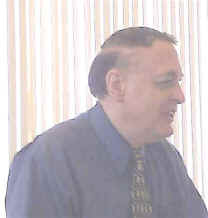 |
After serving the ASA for thirteen years as its Financial/Circulation Manager, Frances Polischuk submitted her resignation to the Council at the ASA/ CSCA 2000 meeting. She has the distinction of serving on the ASA staff longer than any other person. To show our love and appreciation, Carol Aiken catered an English tea party on Frances's last workday, and the staff and their spouses treated she and her husband, Pablo, to a special dinner at a local restaurant. We wish Frances well in her new endeavors.
Before leaving at the end of September, Frances trained a new staff person. Our new Financial/Circulation Manager is Laurie Grover who recently moved to the area with her husband, Herb, and daughter, Amanda. Herb just retired from the Air Force. They reside in Rowley, MA, where both Carol and Lyn live. Herb and Laurie also have a son, Jefferson, who is married and in the Air Force. Laurie and her family lived in Germany for thirteen years. She grew up in western New York on Grand Island, which is surrounded by the Niagara River and just above Niagara Falls. She says that she was attracted to our staff position because of the whole concept of the ASA. We warmly welcome her to ASA. You can contact her directly about membership or billing questions at laurie@asa3.org
On May 15, 1979, a day that will live in infamy for the ASA, the building that housed our offices in Elgin, IL, went up in flames and was closed by the city. With it went most of our records including the date when people joined the ASA. We tried to re-collect that information but many members had forgotten the exact year they joined, thus leaving the space blank in the computer. As I read the early journals, I discovered that lists of new members were published through September 1962 and then the newsletter took over. I was surprised to find my name among the last published journal new members. I also discovered that not everyone who attended the early meetings actually joined. Another discovery was that we still have fifteen active members who joined in 1950 or before. This obviously makes them members for fifty years or more. We honored a couple of them at ASA/CSCA 2000 but I want to give you the whole list -- Henry Beilstein, Wilbur Bullock, James O. Buswell III, Frank J. Cassel, Alfred C. Eckert Jr., William C. Eichelberger, F. Alton Everest, George H. Fielding, Robert B. Fischer, Lawrence H. Johnston, Norman L. Loux, Paul B. Mauer, Russell L. Mixter, Lawrence H. Starkey and Roger J. Voskuyl. We warmly congratulate these people. More lists will be forthcoming in the years ahead.
The last of the fifty lectures in the 1999-2000 Templeton/ASA Lecture Series occurred at the end of September. We had good attendance and interesting lectures. I am happy to announce that the Templeton/ASA Lecture Series was renewed for 2000-2001. Lectures started in October and will end the summer of 2001. This year there will be a total of 74 lectures at 44 colleges and universities. This includes 30 new locations with two lectures each and 14 that had lectures in the 1999-2000 series with one each. Eventually we hope to make some of the videos from the last two years available on the ASA web site. Jack Haas is working on upgrading our equipment. One expansion of the new series is to have two or three lectures in New Zealand. Belize was the first foray out of North America last year. We heartily thank the John Templeton Foundation for continuing this series.
It is my hope that you are thinking Kansas State Univ. (KSU) for this coming July 20-23. The call for papers and posters is in the mail. Please share this information with others whom you know who might be interested. The Affiliation of Christian Engineers and Scientists in Technology (CEST), the Creation Commission, and the Bioethics Commission combined with the Global Resources and Environment Commission are planning symposia. I like the idea of commissions working together to present material. Perhaps other commissions will do likewise. Carol Aiken and the KSU staff are already hard at work filling in the details.
It is hard to believe that 2000 is fast coming to a close and then for us purists the new millennium will really start. Before that occurs, we need to balance the budget, finish the $10,000 matching endowment grant (over $2,000 yet to go at this writing), and have everyone renew their membership.
With the December membership renewals, we are allowing members to renew for three years at a time, if they wish. Many members have asked for this option in the past. We have been listening. For next year, Council has voted to change all of our memberships to a December renewal by prorating those that come due in March, June, or September. Look for these changes in your next billing notice.
Please remember us during the holiday season. We need your gifts to balance the budget and meet the matching endowment grant. We especially need your prayers for the four-day Council meeting in Tickfaw State Park in Louisiana, from Nov. 16 to 20 hosted by President Jay Hollman. We will discuss in depth what our goals are for the beginning years of the new millennium. Pray that the Lord will bless us with productive and innovative planning sessions.